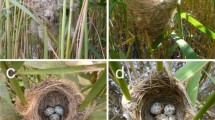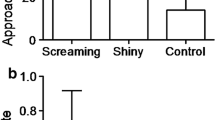Abstract
A long-term study of the interactions between a brood parasite, the great spotted cuckoo Clamator glandarius, and its primary host the magpie Pica pica, demonstrated local changes in the distribution of both magpies and cuckoos and a rapid increase of rejection of both mimetic and non-mimetic model eggs by the host. In rich areas, magpies improved three of their defensive mechanisms: nest density and breeding synchrony increased dramatically and rejection rate of cuckoo eggs increased more slowly. A stepwise multiple regression analysis showed that parasitism rate decreased as host density increased and cuckoo density decreased. A logistic regression analysis indicated that the probability of changes in magpie nest density in the study plots was significantly affected by the density of magpie nests during the previous year (positively) and the rejection rate of mimetic model eggs (negatively). These results are consistent with a hypothesis (the intermittent arms race hypothesis) of spatially structured cyclic changes in parasitism. During periods of parasitism, host defences continuously improve, and as a consequence, the fitness gains for parasites decrease. When host defences against parasites reach a high level, dispersing parasites have a selective advantage if they are able to emigrate to areas of low resistance. Once parasites have left an area hosts will lose their defensive adaptations due to their cost in the absence of parasitism. The scene is then set for re-colonization by great spotted cuckoos.
Similar content being viewed by others
Author information
Authors and Affiliations
Additional information
Received: 7 May 1998 / Accepted: 24 August 1998
Rights and permissions
About this article
Cite this article
Soler, M., Soler, J., Martinez, J. et al. Micro-evolutionary change and population dynamics of a brood parasite and its primary host: the intermittent arms race hypothesis. Oecologia 117, 381–390 (1998). https://doi.org/10.1007/s004420050671
Issue Date:
DOI: https://doi.org/10.1007/s004420050671




